


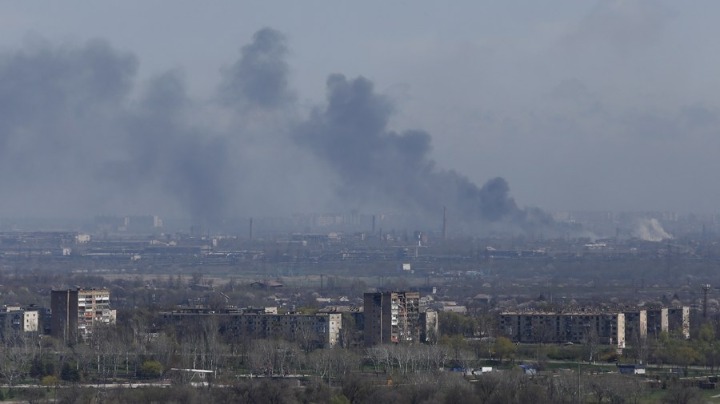
Russia's President Vladimir Putin says his country will continue its yearlong "special military operation" in Ukraine, and he accused the US-led NATO alliance of fanning the flames.
Russia-Ukraine conflict would have cost world economy $1.6 trillion in 2022, according to a study published by the German Economic Institute.

ISTANBUL - The Turkish foreign minister said on Thursday that the Russian-Ukraine grain corridor deal could boost trust between the two sides if implemented properly.
Mevlut Cavusoglu made the remarks in Istanbul during a press briefing following a meeting with Georgian Foreign Minister Ilia Darchiashvili.
"If implemented properly, the agreement could be a very crucial boost of trust between both sides," Cavusoglu said, noting the deal would allow the exports of not only Ukrainian grains but also Russian fertilizers.
Speaking of the Joint Coordination Center in Istanbul that has become operational, the Turkish minister said he hopes the exports will be continuous and reach the countries in urgent need.
"In conflict, everybody loses, and similarly, in peace, everybody wins, as long as a just peace is established," said Cavusoglu, answering a question regarding whether the agreement could lead to a meeting of the opposing sides at foreign ministerial level.
"This conflict will end at a diplomatic table, no doubt. We exercise utmost efforts to bring the sides to the same table, and if they're ready, we would indeed be the host of such an endeavor," he added.
Cavusoglu also detailed some of the plans to increase cooperation between Türkiye and Georgia, including improving the logistics between the two countries as well as expansions of the current free trade deals.
Russia and Ukraine each signed a deal in Istanbul last Friday, respectively with Türkiye and the United Nations, to resume grain shipments to international markets via the Black Sea.
The Joint Coordination Center was opened on Wednesday to monitor the implementation of the grain shipments from Ukraine.
UNITED NATIONS - UN Secretary-General Antonio Guterres on Wednesday welcomed the official inauguration of the Joint Coordination Center (JCC) in Istanbul as "a platform to help operationalize the Black Sea Grain Initiative".
The UN chief thanked the Russian Federation and Ukraine "for nominating and quickly sending their senior representatives to Istanbul," said a statement released by the secretary-general's deputy spokesman Farhan Haq.
Guterres underscored the importance of the parties working in partnership directly to effectively implement the Black Sea Grain Initiative with a view to reducing global food insecurity.
"The work of the JCC will enable the safe transportation, by merchant ships, of grain and related foodstuffs and fertilizers from three key Ukrainian ports in the Black Sea to the rest of the world. This will help to effectively respond to and prevent rising global food insecurity," said the statement.
The Black Sea Grain Initiative, signed respectively by Russia and Ukraine on Friday with Türkiye under the auspices of the UN in Istanbul, would allow significant volumes of commercial food and fertilizer exports from three key ports in the Black Sea -- Odesa, Chernomorsk, and Yuzhny, according to the UN.
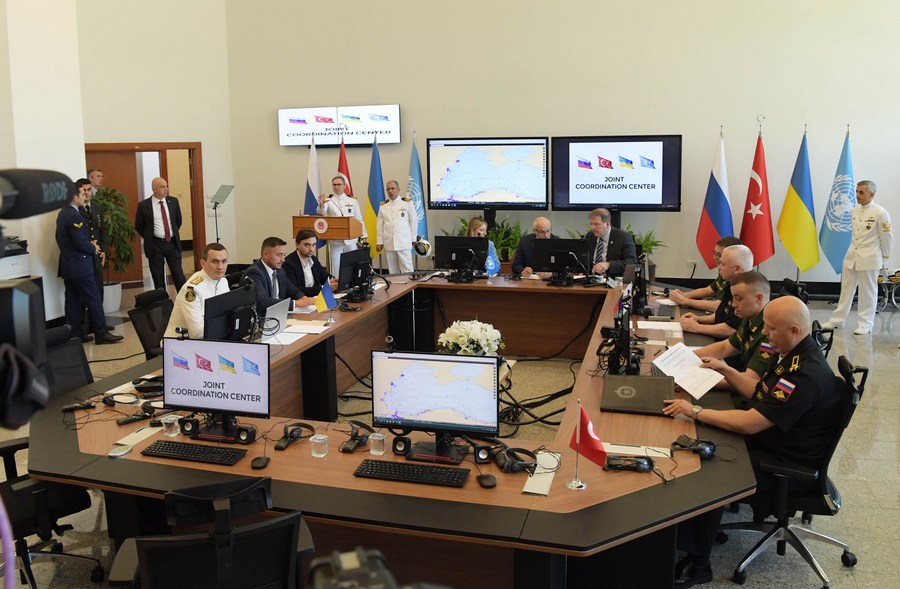
ISTANBUL - Türkiye inaugurated the Joint Coordination Center in Istanbul on Wednesday to monitor the implementation of the grain shipment from Ukraine, Turkish Defense Minister Hulusi Akar told reporters.
Located inside the compound of a military university in the city's European side district of Besiktas, the center consists of 20 representatives from Russia, Ukraine, Turkey and the United Nations, five from each party, according to Akar.
This will guarantee the safe passage of vessels from Ukrainian ports through the Black Sea and the Bosphorus Strait in Istanbul to global markets, said the minister.
At the command center, the representatives were seated around a large square table. A map on a big screen was showing the details of the Black Sea and the locations of several vessels.
"This center will register and follow the commercial ships that will be included in the initiative. It will technically track the journey of the ships through satellite, internet, and other means of communication," Akar said, speaking of The Black Sea Grain Initiative signed in Istanbul on Friday.
Ships will be inspected by joint inspection teams at locations deemed appropriate upon loading at Ukrainian ports and arrival at ports in Türkiye, according to Akar.
"If there is a need for demining, plans agreed by all parties would be made. However, there is no need at this stage," he added.
Earlier, a source who asked to be identified as "a senior UN official" told Xinhua that the shipments will be inspected to make sure there will be no transportation of weapons.
Russian Deputy Foreign Minister Andrei Rudenko said he hoped the deal would work, according to media reports.
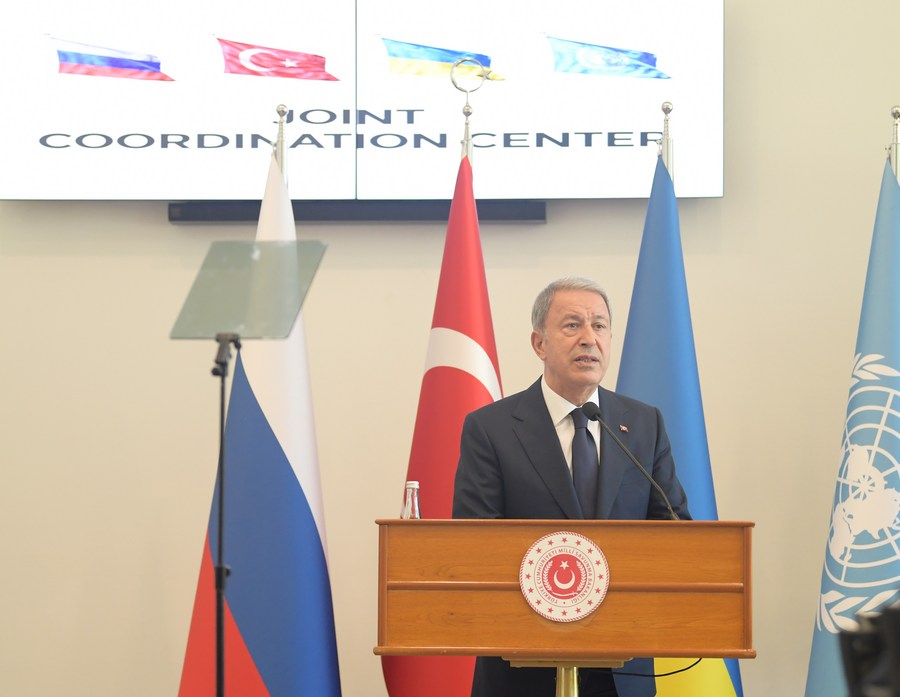
The press service of the Ukrainian Naval Forces said in a statement on Wednesday that operations have resumed in the Ukrainian Black Sea ports of Odessa, Chornomorsk and Pivdenny in line with the grain exports deal signed last week in Türkiye.
Turkish Foreign Minister Mevlut Cavusoglu said on Wednesday that the deal would allow both Ukraine and Russia to export their products.
"There are products to be exported by Russia as well, and the deal paves the way for it. Likewise, it paves the way for the export of Ukraine's grain, sunflower, and sunflower oil," he said on TV100 broadcaster.
Cavusoglu pointed out that Türkiye would continue to play its constructive role to ensure the plan runs smoothly.
Russia and Ukraine signed respectively the initiative with Türkiye under the UN auspices on Friday, which would allow significant volumes of food and fertilizer exports from three key Ukrainian ports in the Black Sea.
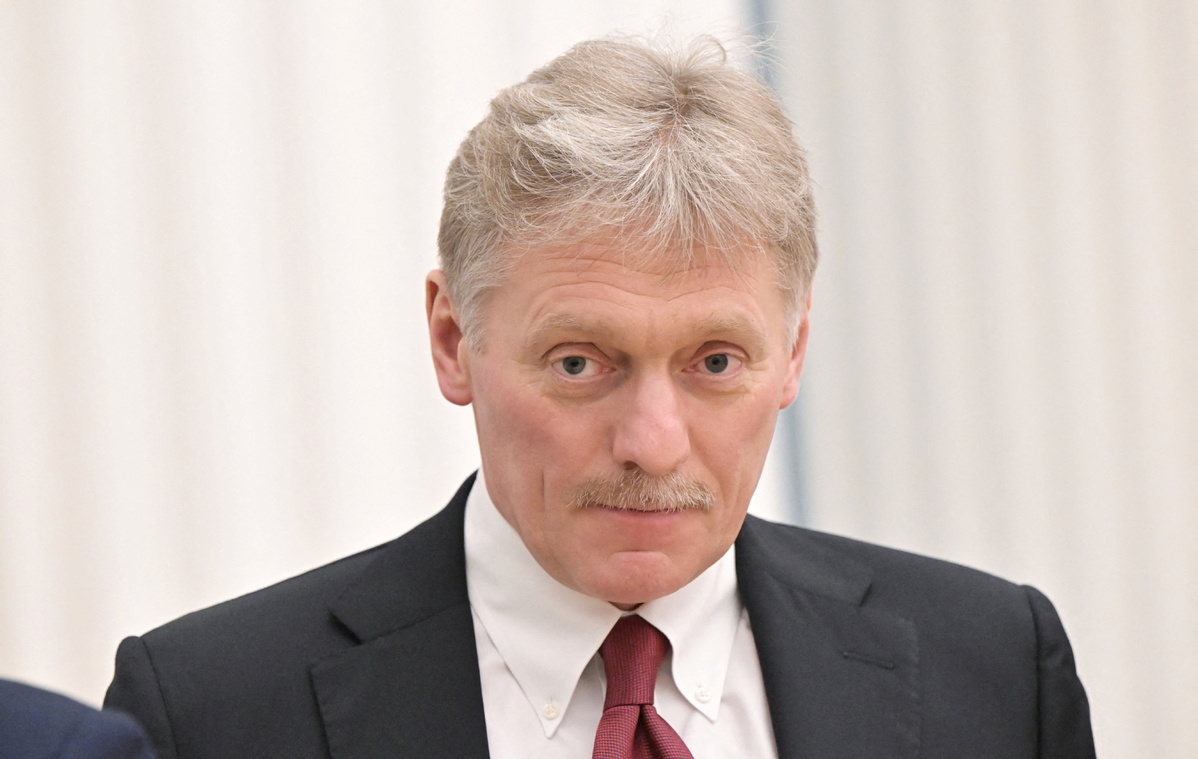
A recent strike carried out by Russian armed forces on Ukrainian military infrastructure in the port of Odessa should not affect the start of grain exports, Kremlin Spokesman Dmitry Peskov said on Monday.
The Russian Defense Ministry announced Sunday that the country's armed forces launched a missile attack on the territory of a shipyard in Odessa, destroying a Ukrainian military ship and a depot with US Harpoon anti-ship missiles.
"This (strike) is only linked to military infrastructure. This is in no way connected with the infrastructure that will be used to fulfill the agreements and export grain," Peskov said commenting on the attack.
KYIV - Ukraine will get some 1.6 billion euros (about 1.62 billion US dollars) from the European Investment Bank (EIB), Ukrainian Prime Minister Denys Shmyhal announced on Tuesday.
"Yesterday, the European Investment Bank agreed to disburse 1.6 billion euros to Ukraine, with 1 billion euros out of this sum to be allocated promptly," Shmyhal told a cabinet meeting, according to the government's press service.
Shmyhal said the funds will be directed for the activities to prepare Ukraine for the heating season, including the restoration of damaged electricity, water and heat supply facilities.
According to the Interfax-Ukraine news agency, Ukraine will also use part of the funding from the EIB to finance projects in energy efficiency, roads, transport, education, infrastructure and other sectors.
Kyiv plans to raise 20 billion dollars in international aid from its Western partners by the end of 2022, said Ukrainian Finance Minister Serhiy Marchenko at a public event last month.

Since the outbreak of the Russia-Ukraine conflict on Feb 24, millions of refugees from Ukraine have crossed borders into neighboring countries or moved farther westward, with Europe now experiencing the biggest refugee crisis since World War II.
As of June 29, over 3.6 million refugees from Ukraine had registered for a temporary protection mechanism or similar national protection program in Europe, according to data from the Office of the United Nations High Commissioner for Refugees.
The vast majority of refugees fleeing Ukraine are elderly people, women and children, as well as Syrian refugees who had fled to Ukraine several years ago. According to UNHCR data, over 1.98 million Ukrainian refugees are currently in European Union countries in Central and Eastern Europe. Poland remains the country that has taken the highest number of refugees from Ukraine, hosting over 1.19 million refugees, followed by the Czech Republic (more than 380,000), Bulgaria (over 118,000), Slovakia (over 79,000), Lithuania (around 58,000), Romania (over 40,000), Latvia (over 34,000), Estonia (over 28,000), Hungary (over 25,800), Croatia (over 15,000), and Slovenia (around 6,860). The 11 EU countries in Central and Eastern Europe have together hosted more than 55 percent of all refugees from Ukraine.
Although most Ukrainian refugees only pass through Central and Eastern European countries or briefly stop over before moving on to other EU countries, the sudden mass influx of refugees has posed a huge challenge for governments and society of CEE countries. All governments, under the support of EU mechanisms, have used domestic resources and mobilized the public and the entire society to demonstrate hospitability and enthusiasm toward Ukrainian refugees in dire need of help.
The Chinese communities in some Central and Eastern European countries have also made generous donations and offered help to Ukrainian refugees.
The EU's various supporting mechanisms have been central to CEE countries' capacity in hosting millions of refugees from Ukraine. On March 4, the EU activated the Temporary Protection Directive, which aims to alleviate pressure on national asylum systems of EU member countries and allows displaced people to enjoy harmonized rights across the EU-including residence, access to the labor market and housing, medical assistance, social welfare assistance and access to education for children. The temporary protection will last for at least one year and up to three years.
The EU has been offering financial support for member states hosting refugees. In April, the EU approved three regulations unlocking more than 20 billion euros ($20.3 billion) in funds, which will ensure that member states hosting refugees have sufficient resources to meet the growing needs for housing, education and healthcare. Also in April, the Council of the EU adopted a regulation, the Cohesion' Action for Refugees in Europe, which allows for the swift release and reallocation of cohesion policy funding. The EU's cohesion policy aims to strengthen economic and social cohesion by reducing disparities in the level of development between regions.
EU member states can use a total of up to 9.5 billion euros of funds that are still not programmed under the 2022 portion of the Recovery Assistance for Cohesion and the Territories of Europe, REACT-EU. They can also use all unallocated resources under the 2014-20 period (around 7 billion euros). Also in April, the Council of the EU approved a regulation allowing for the immediate disbursement of an additional 3.5 billion euros, under REACT-EU, to EU countries welcoming refugees.
Immediately after the Russia-Ukraine conflict broke out, Central and Eastern European countries neighboring on Ukraine started to host a mass influx of displaced people from Ukraine and other countries fleeing the conflict. In early March, many CEE countries, such as Latvia, Slovakia and Bulgaria, approved laws granting temporary protection to displaced people, providing a framework for hosting refugees. The Polish Parliament also approved laws on hosting Ukrainian refugees.
Refugees from Ukraine enjoy quasi-citizenship across CEE countries, which is in line with the principles of EU directives.
In Poland, Ukrainian refugees have been granted the right to obtain a Polish national identity number, and authorities have established a program to provide 270 euros a month to households for each Ukrainian refugee they shelter for two months.
The Czech Republic, with the second-highest number of refugees from Ukraine, has streamlined a process to issue emergency visas to Ukrainian refugees. It estimates that a total of 1.33 billion euros is needed to address the ongoing refugee crisis. The Czech Republic has recently taken over the rotating presidency of the Council of the EU and has vowed to make coping with the refugee crisis its first priority.
Bulgaria's one-year temporary protection regime for Ukrainian refugees took effect on Feb 24, earlier than the rollout of EU programs. In Slovakia, refugees from Ukraine can take public transportation for free and have minimum standard living expenses covered. As of the beginning of July, 1.45 million Ukrainian refugees had entered Romania, but most of them have moved farther westward to Western European countries. Romania has set up 1,238 refugee centers and allowed domestic universities to increase enrollment by 20 percent to provide convenience for refugee students. Latvia has set up assistance centers in Riga, wherein Ukrainian refugees have access to affordable housing, job opportunities and medical and social assistance.
In addition, Ukrainian refugees can enter Croatia by presenting a passport or other ID card at the border. The government of Croatia has set up three refugee affairs centers to provide services for Ukrainian refugees and offered free public transportation, school lunches and use of sports facilities to Ukrainian children.
Hosting refugees requires a large amount of money, and financial support from the EU is not enough to cover all countries' actual needs. Central and Eastern European countries are currently confronted with financial risks amid economic plight, and their negotiations with the EU over increasing support will continue.
The author is a researcher at the Chinese Academy of Social Sciences' Institute of European Studies.
KYIV - Ukraine is preparing to start grain exports via the Black Sea ports this week under the grain deal signed last week in Türkiye, Ukrainian officials said on Monday.
Speaking at a media briefing aired on the Ukrainian Infrastructure Ministry's Facebook page, Infrastructure Minister Oleksandr Kubrakov said the movement of ships from the Black Sea ports is due to start by the end of the current week.
The demining process will be carried out exclusively in the corridor for the passage of cargo ships, and all ship caravans will be accompanied by Ukrainian rescue vessels, Kubrakov said.
Ukrainian Deputy Infrastructure Minister Yurii Vaskov, who also participated in the briefing, said the first grain deliveries will be made from the port of Chornomorsk.
"We expect the first shipment to be made this week," Vaskov said.
Within two weeks, Ukraine also plans to start exporting grain through the ports of Odesa and Pivdenny, Vaskov added.
According to him, the coordination center tasked with supervising and coordinating the functioning of the humanitarian corridor will start its work on July 27.
The supplies of Ukrainian grain to the global market have been affected in recent months due to the blockade of the Ukrainian seaports by the Russian military.
On July 22, Ukraine and Russia separately signed a deal with Türkiye and the United Nations in Istanbul to resume grain shipments from Ukrainian ports to international markets via the Black Sea.
Ukrainian President Volodymyr Zelensky said the deal will enable Ukraine to export 20 million tons of last year's grain harvest and part of this year's harvest.?

KYIV-Russia said on Sunday that its cruise missiles had struck the military infrastructure of Ukraine's Odessa port, destroying a military boat a day after Moscow reached a grain deal with the United Nations, Ankara and Kyiv.
"Kalibr missiles destroyed Odessa port's military infrastructure, sending a Ukrainian military boat to the Kyiv regime's favorite address in a precision strike," Foreign Ministry spokeswoman Maria Zakharova said on Telegram.
Ukrainian President Volodymyr Zelensky said the strike indicated that Moscow could not be trusted to implement the deal. However, public broadcaster Suspilne quoted the Ukrainian military as saying the missiles had not caused significant damage, and a government minister said preparations have continued to restart grain exports from Black Sea ports.
The deal signed on Friday by Moscow and Kyiv and mediated by the UN and Ankara was hailed as a breakthrough after nearly five months of conflict. It is seen as crucial to curbing soaring global food prices by allowing grain exports to be shipped from Black Sea ports including Odessa.
Suspilne quoted Ukraine's southern military command as saying the port's grain storage area was not hit.
Infrastructure Minister Oleksandr Kubrakov said on Facebook that "we continue technical preparations for the launch of exports of agricultural products from our ports".
Ukraine could export 60 million metric tons of grain in eight to nine months if its ports were not blockaded, but Russia's strike could make things not be that easy, said an economic adviser to the Ukrainian president on Saturday.
Ukraine could earn $10 billion by exporting 20 million tons of grain in silos in addition to 40 million tons from its new harvest, economic adviser Oleh Ustenko said on television.
Ukraine will need 20 to 24 months to export those volumes if its ports are not functioning properly, he said.
Egypt ties
Russia's Foreign Minister Sergey Lavrov was in Cairo for talks on Sunday with Egyptian officials as Moscow seeks to break diplomatic isolation and sanctions by the West.
Lavrov landed in Cairo late on Saturday, the first leg of his Africa trip that will also include stops in Ethiopia, Uganda and the Democratic Republic of the Congo, reported Russia's state-run RT.
The Egyptian Foreign Ministry said Foreign Minister Sameh Shoukry held talks with Lavrov on Sunday morning.
Lavrov was scheduled to meet later on Sunday with Arab League Secretary-General Ahmed Aboul Gheit. He was expected to address the permanent representatives of the pan-Arab organization, RT reported.
In an article posted on the Russian Foreign Ministry website, Lavrov rejected the West's accusations that Russia is responsible for the global food crisis, as "another attempt to shift the blame to others".
Seeking to rally African nations on his country's side, he hailed what he called "an independent path "such nations took when they refrained from joining the West in sanctioning Russia.
Agencies Via Xinhua
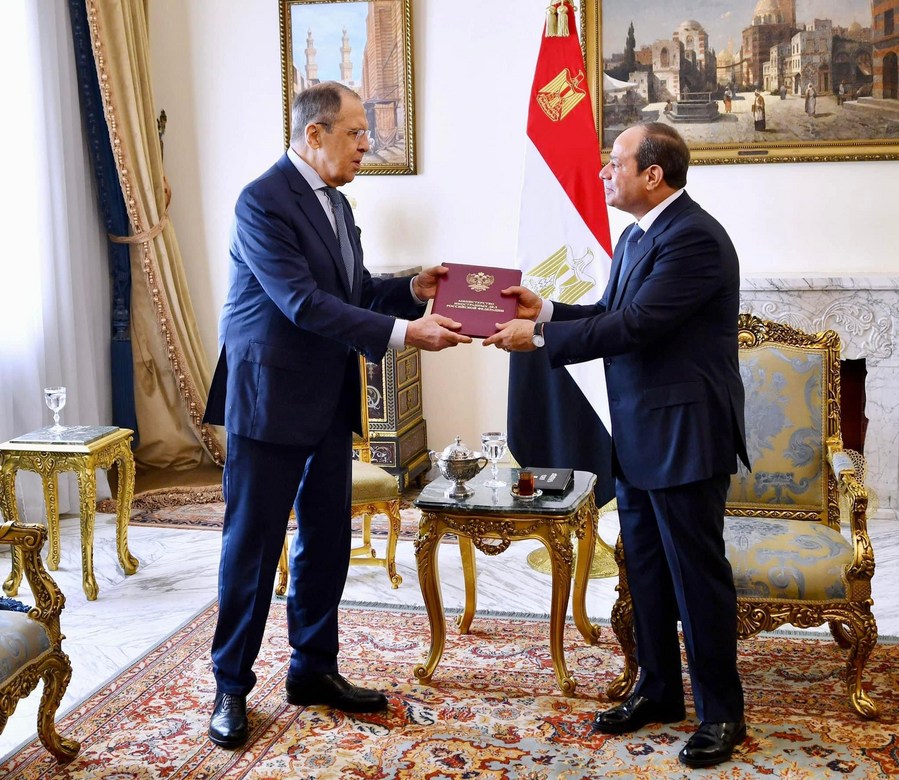
CAIRO - Egyptian President Abdel-Fattah al-Sisi held talks on Sunday with visiting Russian Foreign Minister Sergei Lavrov in Cairo, where they discussed bilateral relations and regional and global issues of mutual concern.
Lavrov handed to Sisi a letter from Russian President Vladimir Putin, expressing the importance Russia attaches to consolidating bilateral ties with Egypt within the framework of the "strategic partnership and cooperation agreement between the two countries," the Egyptian presidency said in a statement.
The Egyptian president hailed the growing cooperation between Cairo and Moscow, which is exemplified by Russian projects in Egypt, such as the El-Dabaa nuclear power plant that is currently being built, and the establishment of a Russian industrial zone on the Suez Canal axis and other joint projects in various fields.
With regard to the ongoing Russian-Ukrainian conflict, Egypt renewed its call for a political settlement of the crisis.
Sisi stressed "the importance of giving priority to the language of dialogue and diplomatic solutions to the crisis," affirming Egypt's support for all endeavors that would settle the issue "politically" in order to maintain international security and stability.
It is Lavrov's first African tour since the beginning of the Russian-Ukrainian conflict that started in late February. The tour is scheduled to include Ethiopia, Uganda and the Democratic Republic of the Congo.
Egyptian Foreign Minister Sameh Shoukry (R) meets with Russian Foreign Minister Sergei Lavrov in Cairo, Egypt, on July 24, 2022. (Photo by Ali Bob/Xinhua)
Following his talks with Sisi, Lavrov held a meeting with his Egyptian counterpart Sameh Shoukry at the Egyptian Foreign Ministry's headquarters in Cairo.
The Russian top diplomat said he had "a constructive dialogue" with the Egyptian president and later with his Egyptian counterpart, expressing Russia's appreciation for the fast-growing relations between the two countries.
Speaking to a joint press conference after meeting with Shoukry, Lavrov lauded the expanding economic cooperation and growing trade volume between Russia and Egypt.
He added that Russia and Egypt have shared views on many regional and global issues, including the Palestinian-Israeli conflict and the crises in Syria, Libya and Iraq.
As for a global food shortage resulting from the Russian-Ukrainian conflict, Lavrov blamed the Western sanctions for obstructing Russian grain exports, noting that Russia and Ukraine recently signed an agreement to help relieve the food crisis through safe corridors in the Black Sea for grain exports.
Lavrov noted that his tour in Africa also seeks to discuss preparations for the second Russia-Africa summit that is scheduled for mid-2023.
For his part, the Egyptian foreign minister reiterated the need to reach "a political and diplomatic settlement" of the Russian-Ukrainian crisis.
Shoukry added that he discussed with Lavrov the Palestinian-Israeli conflict and they both agreed on the necessity of the two-state solution as a settlement to the issue.
Ahmed Kandil, head of the International Studies Unit at Cairo-based Al-Ahram Center for Political and Strategic Studies, said that the timing of Lavrov's tour in Africa is very important as it comes after two recent important meetings, one in Jeddah attended by leaders of the United States and the Gulf Cooperation Council (GCC) member states, plus Egypt, Jordan and Iraq, and the other in Tehran gathering leaders of Russia, Iran and Türkiye.
"Lavrov's scheduled visit to Ethiopia after Egypt could be a message from Moscow that Russia can play an important role in solving the region's issues, the foremost of which is the Grand Ethiopian Renaissance Dam (GERD) crisis," the Egyptian expert told Xinhua, referring to the dispute between Cairo and Addis Ababa on the rules of filling and operating the dam built on their shared Nile River.
Lavrov is scheduled to visit the Cairo-based headquarters of the Arab League (AL) later in the day to meet with AL Secretary-General Ahmed Aboul-Gheit and address the permanent representatives of Arab states at the league.

ANKARA - Russian officials had told Ankara that Russia had "nothing to do" with the attacks on Ukraine's key Black Sea port of Odesa, Turkish Defense Minister Hulusi Akar said on Saturday.
"In our contact with Russia, the Russians told us that they had absolutely nothing to do with these attacks and that they were examining the issue very closely and in detail," Akar told Türkiye's state-run Anadolu Agency.
"The fact that such an incident happened right after the agreement we made yesterday regarding the grain shipment worried us," he said. Akar said he also had phone conversations with Ukrainian ministers and received information regarding the incident.
The Ukrainian military said that Russian missiles hit infrastructure in Odesa on Saturday. A missile hit one of the silos in Odesa and another fell in an area close to the silo. The attack had not compromised the port's ability to load cargo and that grain exports could go on, according to Akar.
Türkiye has sent the two countries a message, in which it said it would like to see both sides continue their cooperation "calmly and patiently" under the agreement signed on Friday, the minister said. Türkiye would continue to fulfil its responsibilities in the agreement, he stressed.
The Black Sea Grain Initiative, signed respectively by Russia and Ukraine on Friday with Türkiye under the auspices of the UN in Istanbul, would allow significant volumes of commercial food and fertilizer exports from three key ports in the Black Sea - Odesa, Chernomorsk, and Yuzhny, the UN said in a statement on its website.
A joint coordination center has started operating in accordance with the agreement to monitor implementation, the Turkish minister added. According to a copy of the agreement released by Andrii Sybiha, deputy head of the Ukrainian presidential office, the deal will be effective for 120 days and can be extended for another 120 days if neither party terminates it. Ukraine is among the world's leading grain exporters, supplying more than 45 million tons annually to the global market, according to the UN Food and Agriculture Organization.

WASHINGTON - The White House announced Friday that the United States will provide Ukraine with an additional package of security assistance worth 270 million US dollars.
According to a factsheet issued by the Department of Defense, the new round of aid includes four "High Mobility Artillery Rocket Systems" and additional ammunition for the HIMARS, four command post vehicles, 36,000 rounds of 105mm ammunition, 3,000 anti-armor weapons as well as up to 580 "Phoenix Ghost" tactical unmanned aerial systems.
Part of the package, totaling 175 million dollars, will be approved directly by President Joe Biden under the presidential drawdown authority, the Pentagon said, with the remaining 95 million dollars coming from the Department of Defense-led Ukraine Security Assistance Initiative funds.
While weapons approved by the PDA are drawn directly from existing Pentagon stocks, the USAI is an authority under which the US government procures weapons from the industry via contracts.
The newly announced package brings total US commitment of security assistance for Ukraine to approximately 8.2 billion dollars since the start of the Biden administration, according to the factsheet.
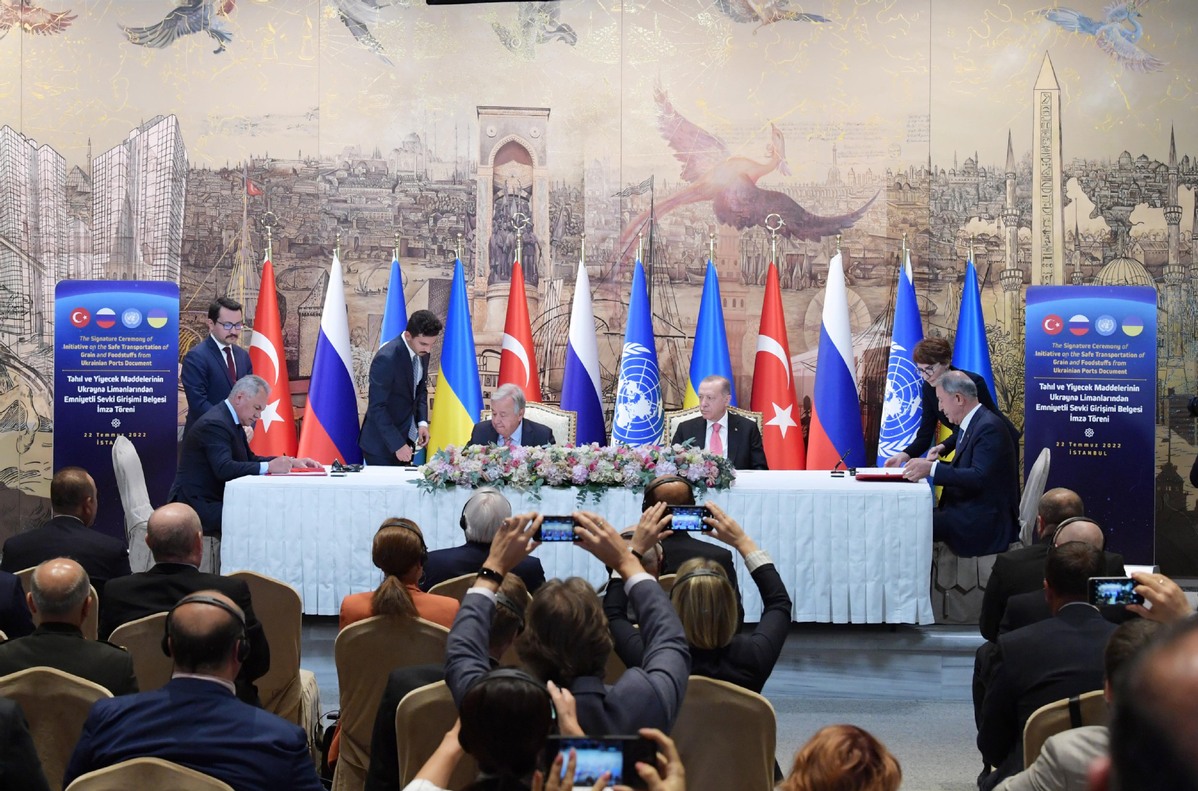
ISTANBUL-A deal for the resumption of Ukraine's grain exports would mark the first step toward easing a global food crisis since the beginning of the Ukraine crisis, according to Ankara.
Ukraine and Russia are among the world's top food exporters, and Ukraine's ports, including the major hub of Odessa, have been blockaded by Russia's Black Sea fleet.
The halt to grain exports during the five-month conflict has caused prices to rise dramatically, and reopening Ukrainian ports may potentially avert famine in parts of the world.
Turkish Foreign Minister Mevlut Cavusoglu said on Twitter on Thursday that a meeting on Friday involving officials from both Russia and Ukraine in Istanbul marks "the first step to solve the current food crisis".
Ankara would continue its efforts to resolve the conflict, Cavusoglu said. He also told state broadcaster TRT Haber that he did not see prospects for a ceasefire but that a deal on the grain exports could boost confidence between the two countries.
The Kremlin also said on Friday it was "very important" to unblock grain exports.
"It is very important to unblock supplies of fertilizers, foodstuffs and grain to the world markets,"Kremlin spokesman Dmitry Peskov told reporters.
Last week, the sides reached a tentative agreement on a United Nations plan that would enable Ukraine to export more than 20 million metric tons of desperately needed grain and other agricultural products that have been stuck in Ukraine's Black Sea ports.
It was due to be signed later on Friday in Istanbul in a ceremony attended by UN Secretary-General Antonio Guterres and Turkish President Recep Tayyip Erdogan, the Turkish presidency said.
Russian Defense Minister Sergey Shoigu and Ukraine's Infrastructure Minister, Oleksandr Kubrakov, were the expected signatories, according to their governments.
Ukraine's presidential aide confirmed on Friday that Kyiv will only sign a grain deal with the UN and Ankara, and the country would not sign any documents with Russia.
Critical need
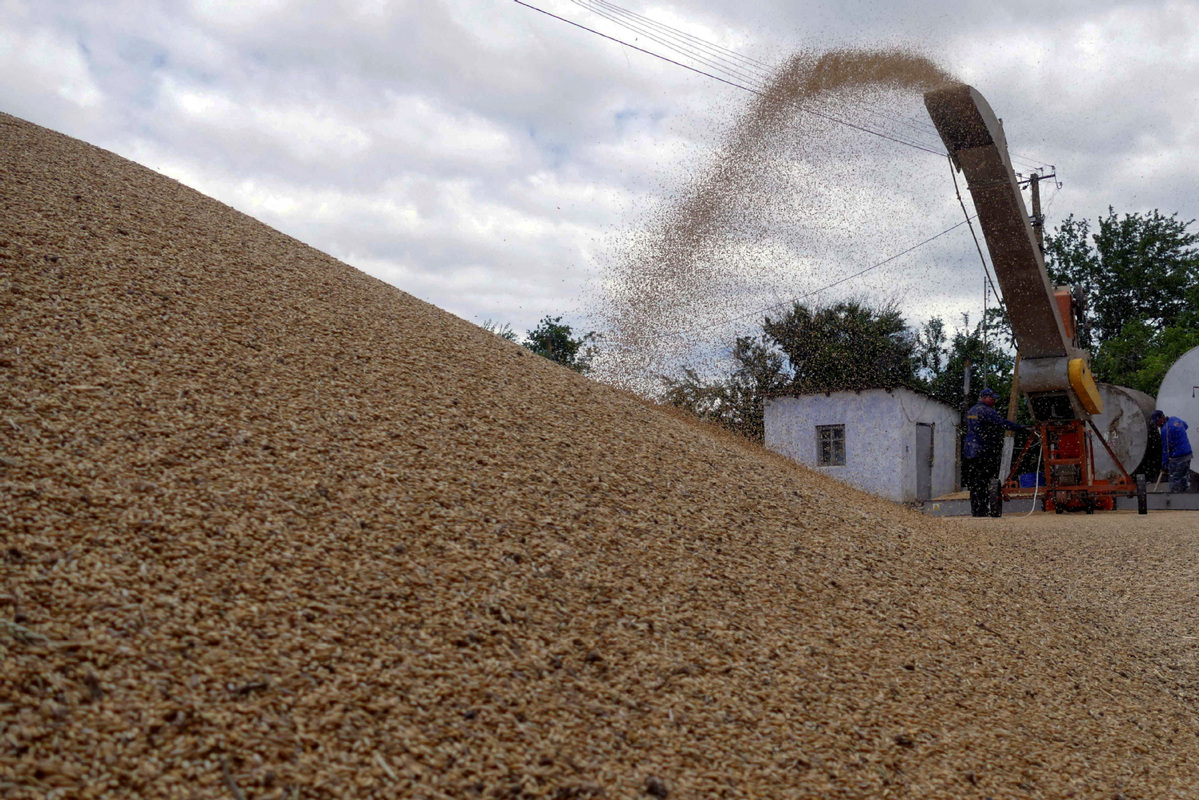
Guterres first raised the critical need to get Ukraine's agricultural production and Russia's grain and fertilizer production back into world markets during meetings with Russian President Vladimir Putin in Moscow and Ukrainian President Volodymyr Zelensky in Kyiv in late April. He proposed a package deal in early June amid fears that the conflict is endangering food supplies for many developing nations and could worsen hunger for up to 181 million people.
In Washington, State Department spokesman Ned Price said the US welcomes the agreement in principle.
In more good news for global markets, Russia on Thursday restored critical gas supplies to Europe through Germany via the Nord Stream 1 pipeline after 10 days of maintenance.
However, suspicion lingered that the continent will have an energy crisis this winter. European Union states have accused Russia of squeezing supplies in retaliation for Western sanctions over the conflict.
AGENCIES - XINHUA
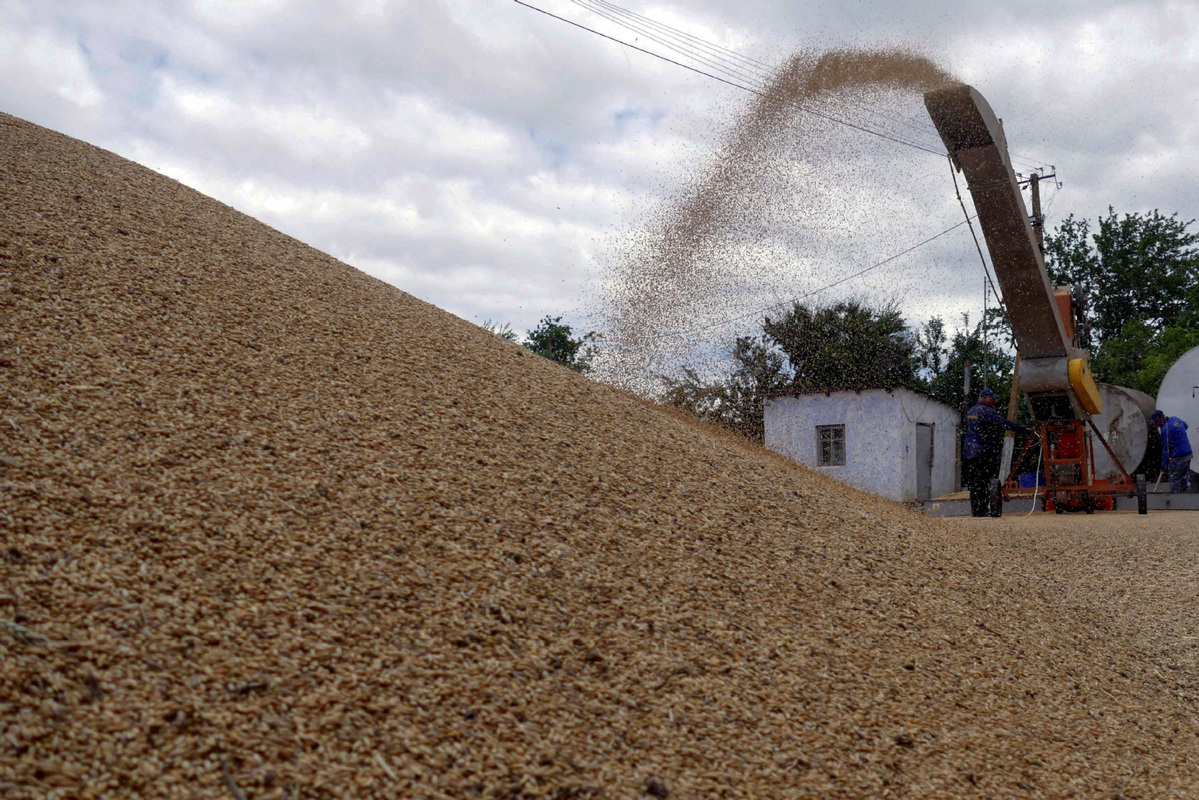
ANKARA -- An agreement to resume grain shipment from Ukrainian ports through the Black Sea will be signed in Türkiye on Friday in a bid to resolve a global food crisis, Turkish Foreign Minister Mevlut Cavusoglu confirmed on Thursday.
"Tomorrow, we will take the first step in Istanbul towards the solution of the food crisis affecting the whole world, together with the UN secretary-general, the delegations of Russia and Ukraine," Cavusoglu tweeted.
"We will continue our efforts to resolve the conflict," he said.
Earlier, the Turkish presidency said that the agreement will be signed on Friday with the participation of Russia, Ukraine, the United Nations and Türkiye.
Turkish President Recep Tayyip Erdogan and UN Secretary-General Antonio Guterres are expected to attend the signing ceremony, which will be held at the Dolmabahce Presidential Office in Istanbul on Friday at 16:30 local time (13:30 GMT), it said.
The agreement comes at a time when there are growing concerns about a global food shortage as a result of the protracted crisis in Ukraine, which is partially blamed for the food price hikes across the world.
Last week, the four parties held their first round of negotiations in Istanbul with an aim to ship Ukraine's grain to the world market to ease the supply shortage.
Türkiye has long served as a mediator in the effort to establish a mechanism that will prevent a food crisis by enabling Ukraine to export its grain to the global market via sea routes.
Istanbul will become an operational hub where the entire shipping process will be carried out, Turkish officials have said.
Türkiye controls maritime traffic entering and exiting the Black Sea through the Bosphorus Strait.

The "geographical objectives" of Russia's special military operation in Ukraine have changed as the West is providing Ukraine with more long-range weapons, Russian Foreign Minister Sergei Lavrov said Wednesday.
Beyond Lugansk and Donetsk, the Russian operation will be expanded to the Kherson region, the Zaporizhzhia region and other territories to push the contact line further away, Lavrov told RT broadcaster and RIA Novosti news agency in an interview.
"Because we cannot allow the part of Ukraine that (Ukrainian President Volodymyr) Zelensky controls or whoever replaces him to have weapons that will pose a direct threat to our territory and the territory of those republics that have declared independence," he said.

Inflation is rampant, food prices are surging, millions of people are falling into poverty each month, and this year the world will burn enough food to feed more than 1 billion people.
Turning edible crops into biofuels for vehicles has long been controversial, but campaigners are now arguing that, in today's world, the practice is "immoral".
The United Nations has warned of a "looming food catastrophe", driven by COVID-19, climate change, and the conflict in Ukraine, which is one of the world's top grain and oilseed producers. An estimated 50 million people are now "just one step from famine", the UN said in a statement.
Meanwhile, each day, European vehicles burn the equivalent of 19 million bottles of plant oil, according to a new report from the campaign group Transport and Environment.
"Supermarkets have had to ration vegetable oils and prices are soaring," said the report's author Maik Marahrens. "At the same time, we are burning thousands of tons of sunflower and rapeseed oil in our cars every day. In a time of scarcity we must prioritize food over fuel."
In 2009, the European Union mandated that 10 percent of fuel for transportation should be derived from biofuels by 2020, meaning that gasoline and diesel are now blended with oil or alcohol produced from plant matter. Environmental campaign group RePlanet said that to satisfy part of this demand, an estimated 10,000 tons of wheat a day is turned into ethanol, which is enough of the crop to make 15 million loaves of bread.
"If Europe doesn't pragmatically look at finding evidence-based solutions, the outcome will be worse for the world's poor, for the climate, and for nature conservation," said Adam Blazowski, chairman of RePlanet. "Europe can and must do better."
Europe has started to rethink its biofuel strategy. In 2018, lawmakers introduced more stringent controls on biofuel emissions, and the European Parliament recently barred the use of palm oil in aviation fuel, citing unsustainable agricultural practices that have led to large amounts of deforestation.
But pausing the road transportation mandate is a much more difficult proposition, as the biofuel industry has become so entrenched. There are 200 biodiesel plants in Europe with a capacity of 20 million tons, and a further 70 bioethanol plants on the continent.
"I fully agree with campaigners who argue that, at a time when millions of people are desperately short of food due to the (conflict in Ukraine), it doesn't make sense to convert food grains into road fuel," said Roger Kemp, a professor of engineering at Lancaster University in the United Kingdom.
A study by agricultural technology company Gro Intelligence estimated that global production of biofuels is equivalent to the annual calorie consumption of 1.9 billion people.
"Unfortunately, reconfiguring supply chains to redirect grains to where they are needed will be difficult to accomplish quickly," said Kemp.
Kemp, who contributed to a Royal Academy of Engineering study on the sustainability of biofuels, said that suspending biofuel production would require numerous national governments to waive legislative requirements, such as the EU's biofuel mandate, and companies would have to tear up long-term contracts to buy products.
"And of course, there will be plenty of lawyers to ensure their clients are not financially disadvantaged by mothballing their factories," he added.
Biofuels have been used in cars as far back as 1910, when German inventor Rudolph Diesel used peanut oil to power his engine. Today, biofuels are touted by some as a sustainable and renewable alternative to fossil fuels. In some instances this is correct: biofuels derived from waste-so-called second-generation biofuels-require no changes to land use and can achieve carbon footprints one-tenth that of gasoline.
But transportation mandates have encouraged a major industry dedicated to first-generation biofuels, which are derived from edible crops that could be used for people or animals, often grown on deforested land.
"However, the technology for producing large amounts of liquid fuels from forestry waste, straw, miscanthus (silvergrass) and similar potential sources does not yet exist," said Kemp.
In 2018, Europe passed a regulation that new biofuel plants must achieve 60 percent greenhouse gas savings when compared with fossil fuels, up from 35 percent. Even so, waste products account for a minority of the feedstocks for all biofuels.
In 2020, oils derived from rapeseed, palm, soy, and sunflower crops made up 78 percent of biodiesel production, and just 17 percent came from used cooking oil, according to market analysts Oilworld.
The EU also uses large amounts of imported oils to satisfy biofuel demand, including around 5 million tons of palm oil annually. Europe also imports around 3 million tons of refined biodiesel annually.
Around 20 percent of ethanol used for transport in the EU is imported, with the United States and Brazil among the largest contributors.
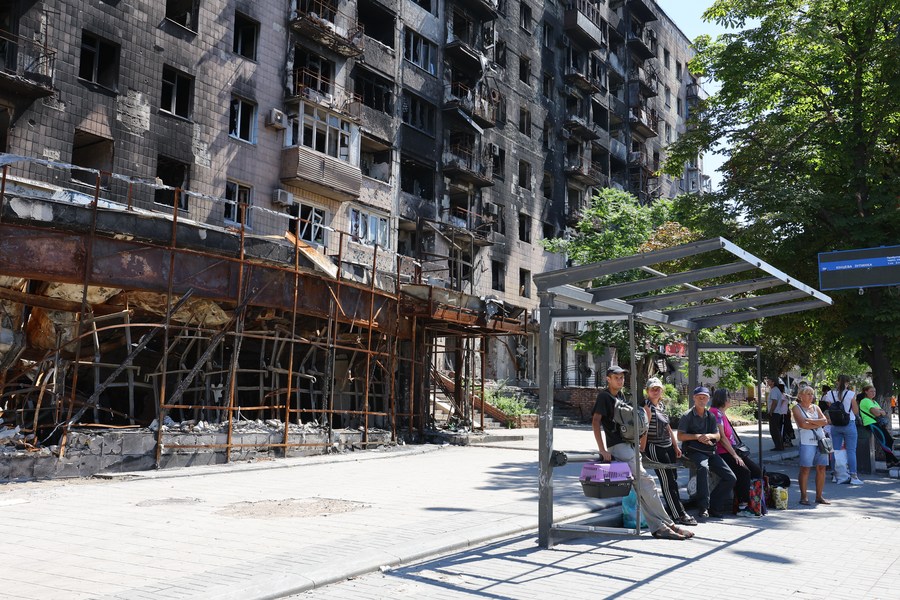
BRUSSELS -- The foreign ministers of the European Union (EU) member states on Monday agreed to grant Ukraine an additional 500 million euros (507.7 million U.S. dollars) in EU military aid.
Josep Borrell, high representative of the EU for foreign affairs and security policy, told a news conference here following the Foreign Affairs Council meeting that the ministers agreed on tightening the sanctions on Russia and closing the loopholes in the current measures.
The decision came after a video debriefing on the latest developments by Ukraine's Foreign Minister Dmytro Kuleba.
Borrell said the ministers "unanimously agreed" on the need to continue to stand firmly with Ukraine. The bloc's total contribution in military aid now stands at 2.5 billion euros.
He confirmed that the ministers also discussed the European Commission's latest proposal on banning Russian gold imports and amending the extension of sanctions. He said that the member states' ambassadors will discuss the measures this week. (1 euro = 1.02 US dollars)

ANKARA - Delegations of Russia, Ukraine, Türkiye and the United Nations will most likely meet this week for a new round of talks on Ukrainian grain exports, Turkish Defense Minister Hulusi Akar said on Monday.
The first meeting held Wednesday in Istanbul concluded with a consensus on "a plan, general principles" regarding the export corridor, he said at a meeting with commanders of the Turkish armed forces in the capital Ankara.
"We are continuing our efforts to turn this into a concrete implementation plan. A meeting on this is likely this week," said Akar.
Technical issues such as the establishment of an operation center in Istanbul, conducting joint controls at exit and arrival points, and ensuring navigational safety on the transport routes will be discussed at the next meeting, he noted.
The talks came at a time of soaring food prices in the global market and subsequent food shortages, due to the repercussions of the prolonged crisis in Ukraine.
Türkiye has long been playing a mediating role, seeking ways to establish a mechanism that will allow Ukraine to export its grains safely.
Russian forces destroyed a depot housing Harpoon anti-ship missiles delivered by NATO countries in Ukraine's important port city of Odessa with high-precision long-range air-based missiles, the Russian Defense Ministry said Sunday.
It said Russian forces also shot down one Ukrainian MI-17 helicopter near the town of Slavyansk in Donetsk, and one SU-25 warplane of the Ukrainian air force in the Kharkov region.
Ukrainian President Volodymyr Zelensky said on late Sunday that he had decided to dismiss Prosecutor General Iryna Venediktova and head of the Security Service of Ukraine Ivan Bakanov, the presidential press service reported.
In his address to the nation, Zelensky blamed Venediktova and Bakanov for insufficiently dealing with a large number of traitors in their agencies.
As of Sunday, Ukrainian authorities had launched 651 criminal proceedings on charges of "treason and collaboration activities" in law enforcement agencies, Zelensky said.
More than 60 employees of the prosecutor's office and the Security Service of Ukraine were "working against our state," he added.
The ongoing conflict between Russia and Ukraine has deepened the food crisis in West Africa, according to a report released by the Economic Community of West African States (ECOWAS), a regional integration body of the 15 West African countries.
Sekou Sangare, ECOWAS commissioner for agriculture, environment and water resources, released a report on Tuesday to the ECOWAS Council of Ministers and Heads of State. He explained that countries including Benin, Cabo Verde, Gambia, Senegal and Togo are heavily dependent on trade with Russia and Ukraine, and have at least 50 percent of their import share in terms of wheat purchase.
"If we look at the national level, many countries will be seriously affected by the crisis in Ukraine. Countries such as Benin, Cabo Verde, Gambia, Senegal and Togo are heavily dependent on trade with Russia and Ukraine for more than 50% of their import share", Sangare said.
The report shows that the dependence of ECOWAS countries on conflict countries makes them even more vulnerable to external fluctuations and threatens the socio-political environment. For example, the rise of chemical fertilizers' prices, for which Russia and Ukraine are the main sources of imports for several countries in the region, is a threat for the next agricultural season.
Russia and Ukraine are two major world suppliers of nitrogen and potassium fertilizers respectively, and they contribute to the supply of compound fertilizer production units installed or suppliers of complex fertilizers in West Africa and the Sahel.
Countries such as Benin, C?te d'Ivoire, Guinea and Sierra Leone import more than 46 percent of their sunflower oil mainly from Ukraine, while Russia has supplied more than 50 percent of fertilizer to Cote d'Ivoire, Senegal, Mali, Niger and Sierra Leone, the report noted.
In a meeting with Russian President Vladimir Putin in June, African Union Chairman Macky Sall said that Africa was "at the mercy" of the war in Ukraine. On his Twitter page following the meeting, he said that president Putin had "reassured" him that Russia was prepared to ease exports of Ukrainian cereals and ensure exports of Russian wheat and fertilizer.
"Our countries, even if they are far from the theatre (of action), are victims on an economic level," Sall said.
According to the United Nations (UN) figures, more than 44 percent of wheat consumed in countries on the African continent comes from Russia and Ukraine. Wheat prices have since soared by 45 percent as a result of the supply disruption, according to the African Development Bank.
Over 18 million people are facing severe hunger in the Sahel, a part of Africa where farmers are facing their worst agricultural production in more than a decade, the UN has warned.
However, Liberian President George Weah also recently spoke on the effects of the Russia-Ukraine war and disclosed that Liberia's economy is dependent on food and oil imports, and is currently faced with rising prices of such commodities as a result of the Russia-Ukraine war.
Weah said the rise in cost of oil will have a severe adverse impact on the environment, as people will seek alternative means for energy, adding that the longer the war in Ukraine persists, the more the environment will be affected.
